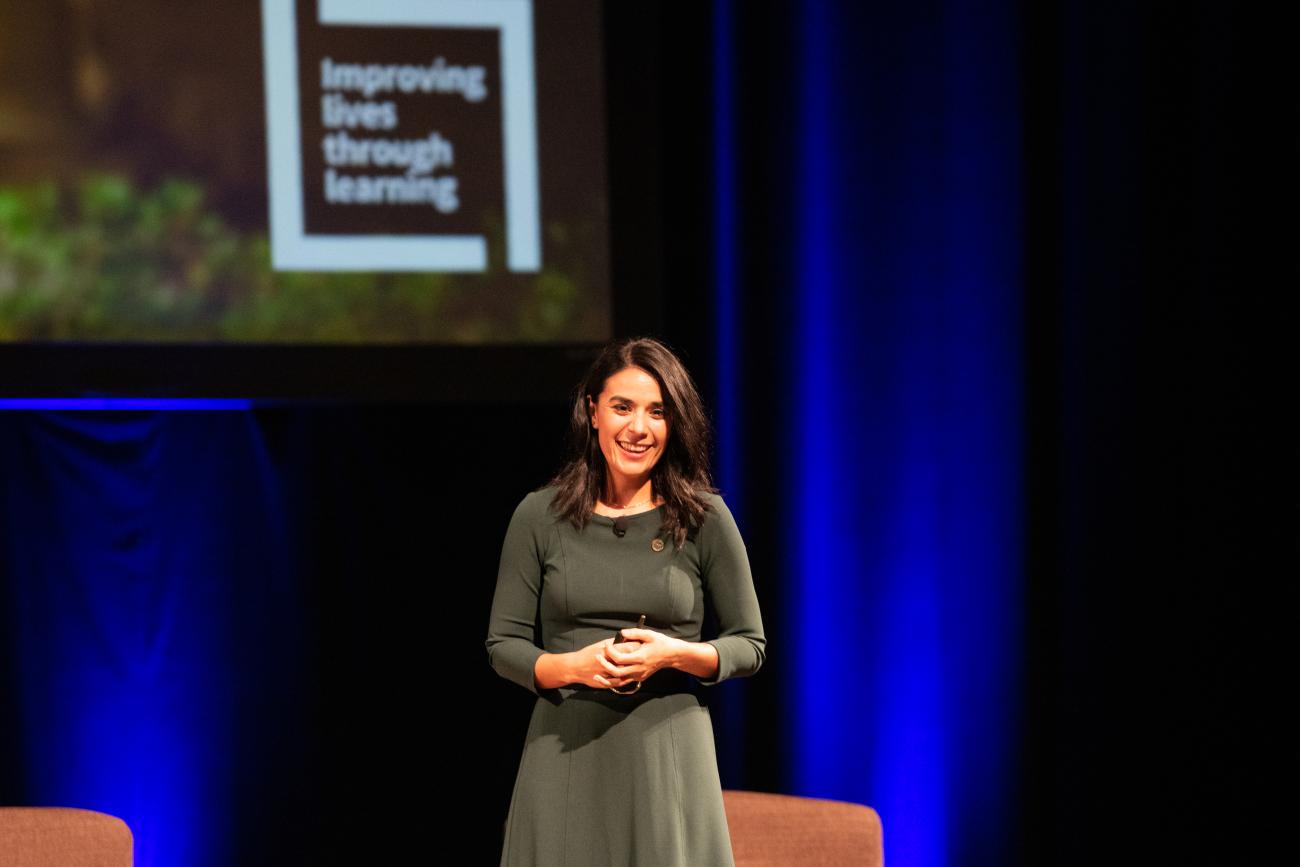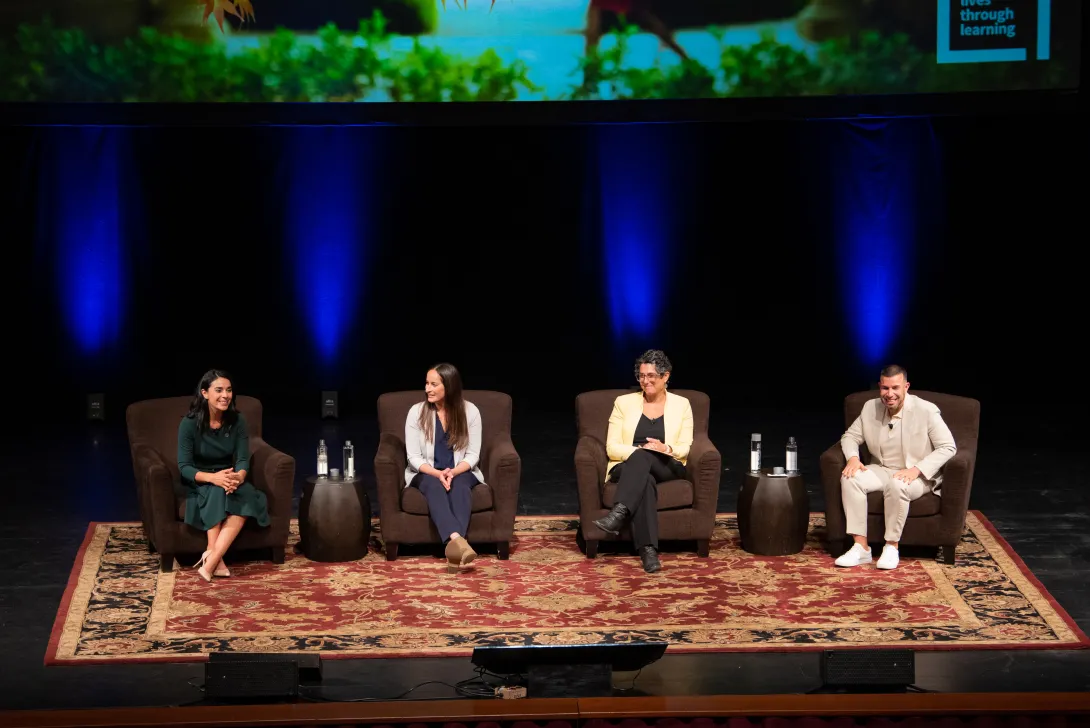
At Stanford GSE event, former National Teacher of the Year Juliana Urtubey makes a case for a “joyous and just” education for all
If you ask Juliana Urtubey — the 2021 National Teacher of the Year and a board-certified bilingual and special education teacher — what it means to create a “joyous and just” education for all, she’ll liken it to building a community garden.
The work requires many hands with different gifts, a dedication to time in the dirt and resources to help it grow. Luckily, Urtubey says that educators and policymakers aren’t far off.
“When people are telling you that the future of education is not hopeful, that we don’t have diverse teachers coming into the pipeline, that we don’t have people committed to making education better, I have to tell them that’s not the truth, because of the rooms and spaces I get to be in,” she said in a moving lecture at Memorial Auditorium on May 3, centered around bettering student learning environments.
During the 85th annual Cubberley Lecture, a series hosted by Stanford Graduate School of Education (GSE) that focuses on critical topics in education, Urtubey offered the audience of teachers, students, education leaders and others strategies for creating classrooms that respected and challenged those with learning differences and those who speak languages other than English at home. Her keynote, entitled “A Joyous and Just Education for All,” was followed by a panel moderated by GSE Associate Professor Jonathan Rosa that included Stanford alumnae Lauren Camarillo, a 2023 California Teacher of the Year, and Tara Kini, chief of staff and director of state policy at the Learning Policy Institute.
Click here to watch the video recording!

GSE Associate Professor Jonathan Rosa (far right) led a panel discussion that included Urtubey (far left), Stanford alumnae Lauren Camarillo (center left), a 2023 California Teacher of the Year, and Tara Kini (center right), chief of staff and director of state policy at the Learning Policy Institute.
Before the lecture, Urtubey met with students from the Stanford Teacher Education Program, of which Camarillo and Kini received degrees.
“I come with this fundamental belief that children with learning and thinking differences can be all the things, including multilingual,” said Urtubey, who immigrated to the U.S. from Colombia with her family as a young child.
Joyous and just
Broken down, Urtubey said that true joy comes from knowing one's intrinsic value and how it ties to others in the community; while justice in education comes from a system that shapes its policies around the voices and stories of students.
“A joyous and just education is one that embraces students and their families, allows students to learn as they are and is guided by student voices and needs,” Urtubey said.
During the panel discussion Rosa, who is also a faculty affiliate of the Stanford Center for Comparative Studies in Race and Ethnicity, asked Urtubey about the practical work of reframing education and seeing skills where others see problems.
“Sometimes the biggest work we can do is take a step back and listen to the people in our community,” Urtubey said. “I think that the reframes come from listening to these stories and addressing them.”
Camarillo, a high school teacher, added that inclusion is key in reframing education.
“I think when students know that you honor who they are, whether it’s their strengths or challenges, you’re promoting a sense of inclusion on a small level,” she said.
On the policy side, Kini said that inclusion means working to ensure that every child has a teacher like Urtubey or Camarillo leading their classrooms.
“We need to think about, what are the policies that enable competitive compensation for teachers so we can have and hold on to expert teachers in our schools,” Kini said.
Cultivating students
Like many educators, Urtubey has had to re-commit herself to the teaching profession in tough times.
“During Covid I went through a lot of reflection about the ability to sustain this work,” she said. “And in this time of reflection I often try to do a pros and cons list of whether I should stay in the classroom.”
Ultimately, she says it’s her students that always bring her back.
“All that comes to my mind are stories of when my students reminded me that the closer I am to them, the more hopeful I will be as a practitioner.”
Camarillo agreed that students have remained the driving force behind her commitment to education.
“Being close to students, seeing their passion and the way that they uplift their peers is what inspires and sustains me,” she said.
Patience for the harvest
“Hope is a commitment,” Urtubey said.
One she first saw in her mother as she pooled community knowledge in the search for an excellent bilingual school for Urtubey and her sisters to attend when she was a child.
“I don’t believe that every family should have to go searching far and wide for a joyous and just education,” Urtubey said. “I believe we have the resources in this country and the people power to make it happen at each and every single school.”
One of her first successes in creating a safe space for students was a school garden she started at her Las Vegas elementary school, because she felt a division between staff and the community. The garden helped to remedy that.
“This informed me and the teacher I would become,” she said. “We never know what’s growing underground and we never know the impact that we have when we connect to other people.”
Bringing her mother to the garden for the first time and seeing students teach her how to rake, water and care for plants, brought her full circle.
“I guess what I didn’t realize is that I built the garden for her,” she said. “For her to stand in the garden and see my students full of joy and full of justice.”
Faculty mentioned in this article: Jonathan Rosa



